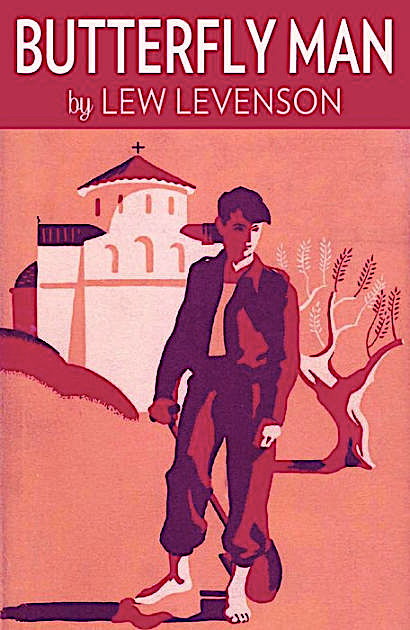IN THE WORDS of the English author G. K. Chesterton: “A good novel tells us the truth about its hero; but a bad novel tells us the truth about its author.” This adage comes to mind after reading Lew Levenson’s novel, Butterfly Man. The book was first published by the Macaulay Company in 1934 and reprinted by Castle Books in the 1950s.
 While details about Levenson’s busy life remain a little sketchy, he left a trail of credits as a writer that include a stint in Hollywood as a screenwriter for the early talkies (1933–34) and a much longer career as a journalist. Although he contributed articles to a number of mainstream publications such as McCall’s, The New York Times, and The Nation, he was a committed communist who became a baseball reporter for The Daily Worker under the byline Charles Dexter. Butterfly Man would seem to be his only published novel. Despite the paucity of personal information about the author, the novel makes it clear that Levenson must have been entirely familiar with the gay demimonde that it depicts.
While details about Levenson’s busy life remain a little sketchy, he left a trail of credits as a writer that include a stint in Hollywood as a screenwriter for the early talkies (1933–34) and a much longer career as a journalist. Although he contributed articles to a number of mainstream publications such as McCall’s, The New York Times, and The Nation, he was a committed communist who became a baseball reporter for The Daily Worker under the byline Charles Dexter. Butterfly Man would seem to be his only published novel. Despite the paucity of personal information about the author, the novel makes it clear that Levenson must have been entirely familiar with the gay demimonde that it depicts.
Given its age and copyright status, curious readers can find the novel in the public domain and make their own assessment of its quality. But there is little doubt that most literati would regard Butterfly Man a mediocre novel at best, and few would disagree with an unreferenced review in the Galustian catalogue characterizing the book as “anti-faggot trash.” While lacking literary gravitas, Levenson’s novel does provide a closeup look at the gay underworld of 1920s urban America. When the novel begins, the protagonist is seventeen years old and newly graduated from high school. The story ends in 1930, when he’s 26. This timeframe roughly coincides with the so-called “Pansy Craze” era. Butterfly Man opens up an LGBT time capsule with its descriptions of after-hours gay clubs, drag balls, and a diverse array of gay characters. But the novel’s primary focus is on the circumstances encountered by its central character, Kenneth Gracey, a naïve boy from a small town in Texas who has a gift for dancing.
§ Although Ken does achieve a short-lived success on Broadway, his career—and his life—ultimately succumb to alcoholism and self-loathing. But more about that later. To begin at the beginning: Soon after graduating from high school, Ken leaves Selma, Texas, in the care of a “mysterious” oil millionaire to whom his father is in financial debt. The older man, Mr. Lowell, tells Ken that “You shall give me youth—I shall give you wisdom” as they travel to Star Ridge, the name of Lowell’s villa in Malibu. Like many of the players who inhabit the novel, Lowell’s character lacks subtlety; readers are hit with repeated hints about the older man’s predatory sexual nature—a chicken hawk par excellence. Predictably, Mr. Lowell gets Ken drunk one night, and this leads to a sexual encounter. Indeed Ken gets so drunk that later he isn’t sure if the event really happened or if it was all just a dream. Later on in the novel, we’re told that Ken’s face becomes a “study in hatred” when he recalls “the obscure memory of an unforgettable night at Malibu.” Prior to this encounter with Mr. Lowell, readers have only a vague indication of Ken’s sexual orientation. Recalling a boozy high school hayride during which he was fondled by a sixteen-year-old girl—“She did that curious thing. He felt the cleverness of it, the perfected rhythm, the knowing pulse”—we’re told that the episode made Ken “a little ill,” as when “smelling sulphur” or “tasting cold fried mush.” When he’s taken to a Hollywood Boulevard bar by his dance instructor (lessons paid for courtesy of Mr. Lowell), an incredulous Ken slowly realizes that the male patrons are gay, though as a youth in Texas “he had never conceived the possible existence of such coteries.” After his visit to the gay bar and his belated realization of Lowell’s interest in him, Ken determines to leave Malibu, and in language worthy of any penny dreadful: “The horrible old man was spidery. He sat inverted in the midst of this, his web, and lured innocent boys into his gaping maw.” Afterwards, Ken teams up with Anita Rogers, an older, been-around-the-block vaudevillian whom he meets at dance school. The two form a dance act, performing first in a third-rate theater in San Bernardino and then, after Anita fails to appear for an evening performance at a legitimate venue in San Francisco, in a “gaudy and noisy” dance hall cum pick-up joint in Tijuana, Mexico. Initially grateful to Anita for encouraging and honing his dancing skills, Ken later grows to hate her because of her drunkenness and her repeated sexual advances. Eventually, Ken leaves Mexico and makes his way to Manhattan, where he lands a role in a new musical called “Sweeter than Sweet.” Now recognized as a gifted dancer, he begins a relationship of sorts with the show’s producer and director, Howard Vee. Details about Ken’s sexual activities are largely withheld, implied rather than described. Readers are meant to understand that once Ken finally accepts his true feelings for Howard (“I can drop all the sham—you’ll let me be myself, won’t you?”), physical intimacy follows. This is confirmed in a subsequent chapter, again via allusion, when Ken reflects that “nothing could make him forget the perfection of the last two weeks.” Following their vaguely referenced sexual interlude, Howard departs for London to work on a new musical, and “Sweeter than Sweet” closes on Broadway; the production goes on the road. While driving to the tour’s first stop, Ken confesses to chorus boy Frankie Reagan that he’s glad to be free of Howard and his “emotional orgasms,” telling Frankie: “I’m going gay.” During the road tour, Ken becomes more accepting of his gay identity, at least superficially—and with the aid of copious amounts of alcohol. Whether hosting “come-one, come-all” nightly drinking marathons in his hotel suite, visiting out-of-the-way gay clubs, or dropping in to observe “negro” drag balls, Ken is increasingly exposed to gay men, and the occasional lesbian—people he refers to as citizens of “our world.” By around the middle of the novel, most 21st-century readers will have come to understand what prompted the epithet “anti-faggot trash” to describe it. There isn’t a single negative stereotype or outdated myth about male homosexuals that isn’t ascribed to Ken or most of the gay men who surround him. These myths can be summarized as the following four clichés about gay men and gay life, all of which can be found in unmistakable form in the novel: § Gay men really want to be women. In preparation to attend his first drag ball as Cara, outfitted in a golden gown and wearing a wig of “natural titian,” Ken, standing before a mirror, admires himself, seeing the face of “a refined and charming woman.” Readers are later informed that when he’s drinking, Ken’s mind seems “to escape the limitations of his body” and he imagines himself to be “the lady superintendent of a girl’s seminary … or a redheaded woman acrobat … or Aunt Emily Winterbottom giving lessons in etiquette.” § Gay sex is dangerous, even deadly. Without remembering how he got there, a drunken Ken finds himself in the apartment of a Chicago gangster named Rocco and his gang of “fifteen delectably human morsels.” After dancing for the group, Rocco christens Ken “my butterfly man.” The next day, Ken arrives at the theater dirty, with torn clothes and uncertain memories. After learning of Ken’s visit to Rocco, his chorus boy chum, Joe Durazzo, tells him that it’s “lucky you got out alive,” the implication being that Ken had been gang raped by Rocco, et al. § Gay sex is dirty. Toward the end of the novel, traveling on a train back to New York following a sober hiatus in Texas, Ken meets Tommy Cook. Tommy, a fanboy from the earlier roadshow, is described as “golden, pink and cherubic.” Ken welcomes him as a “heaven-sent” companion meant to support his efforts to resume a successful dance career—until Ken is diagnosed with syphilis, which he contracted from young Tommy. He calls the boy an “unclean bitch” and throws him out. § Gay men can never be happy. Remember the following line from The Boys in the Band? “Show me a happy homosexual and I’ll show you a gay corpse.” It could serve as the novel’s leitmotif. Through the course of the novel, Ken’s growing awareness of his gay identity is matched by his increasing reliance on alcohol, an inexorable decline in his dancing skills, and a burgeoning swell of internalized homophobia. In the novel’s last chapter a streetwise drinking companion, Feathers, declares that Ken is “just a rotten old fag.” Given this prelude, Ken’s eventual demise is inevitable; a desperate, drunken attempt to return home to Texas by treading the waters of the Hudson River concludes with his drowning. So ends Butterfly Man. A once talented dancer loses his youth, his career, and his life. And why? Because he has succumbed to the evils of homosexuality. Even this brief retelling makes plain why no one would regard this novel as a gay classic worthy of acclaim. But for all the clichés, the broad characterizations, and the negative stereotypes, the novel is not without value. Readers today should not discount the unique opportunity to glimpse a slice of gay life in 1920s America, making the book worthwhile from a strictly historical perspective. Understanding our past helps us to bring context to the present and to develop guideposts for the future. Nevertheless, because Ken’s trajectory of self-destruction plays into the now largely discredited sentiment that embracing a gay identity automatically leads to despair and ruin, some readers may find Butterfly Man passé in the extreme, if not downright offensive. After all, same-sex attraction is no longer considered an illness by legitimate medical organizations as it was in 1934. Gay marriage is legal, and references to gay identities are no longer deeply camouflaged in novels and other expressions of cultural values. But despite these advances, one cannot deny the fact that stigma and homophobia and other manifestations of anti-gay bigotry are still with us. Consider that a December 2023 report by The Trevor Project documented over 1,300 practitioners actively engaged in “conversion therapy” across the U.S., and a growing body of evidence supports the notion that the rejection and prejudice experienced by sexual and gender minorities can often become internalized, resulting in increased rates of depression, alcohol and substance abuse, and suicide. From this perspective, Ken’s demise becomes a textbook example of what today’s psychologists classify as “deaths of despair” that result from people’s inability to cope with modern life and pressures, including prejudices inflicted by society itself. While Levenson may not have possessed the skill to portray Ken’s demise in a more nuanced way, there’s no doubt but that he was well acquainted with the consequences of homophobia. Was this awareness based on his own experience, or had he observed its effects in others? That question cannot be answered without more information about the author. But we can say with certainty that Levenson understood the negative consequences that can result when a person is not allowed to embrace their authentic sexual nature.
Ronald Valdiserri, MD, is a professor of epidemiology at the Rollins School of Public Health, Emory University.





